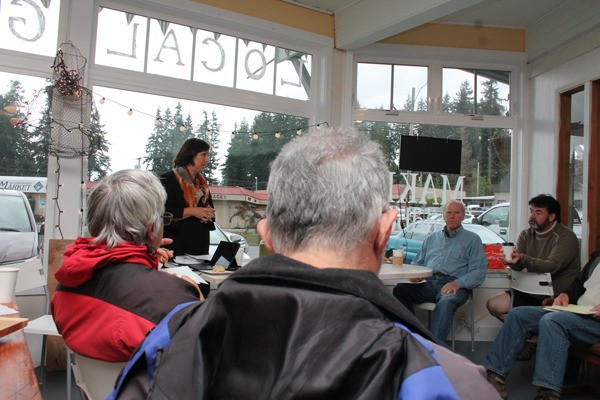Getting fireworks restricted was a uniformly endorsed topic during Island County Commissioner Helen Price Johnson’s informal chat with constituents in Clinton on Thursday.
A dozen people crowded the storefront of Make Whidbey, a cafe, shop and children’s play space in Clinton, to speak with the commissioner during a two-hour visit. She discussed Clinton’s thriving but sometimes unseen industries such as Abundant Earth Fiber and Britt’s Pickles, the upcoming Port of South Whidbey market analysis of Clinton, the ongoing work of the non-elected Clinton Community Council and the changing nature of Island County. Price Johnson is a member of the council, which is working to represent a unified voice for the unincorporated area of Clinton.
The most passionately discussed topic was the ban of fireworks, brought up by a Langley resident who said he hated the holiday explosives. Most of the visitors who spoke supported a strong ban, one that limited the discharge of fireworks only to Independence Day, July 4. The commissioners backed away from an emergency ban this year after it was proposed by Price Johnson and supported by Commissioner Rick Hannold. The latter, who represents North Whidbey and Camano Island, withdrew his support despite a drought and high risk of fire danger throughout the county. He changed his mind after hearing from constituents who support fireworks.
If she got support from another commissioner, Price Johnson said the board is legally required to wait 12 months before a fireworks ban would take effect. No ban is likely to occur during 2016.
Some of the more involved points of her brief presentation were about transportation and balancing rural character with landowners’ desire for financial growth. Service cuts made by Island Transit earlier this year and proposed fares on the currently fare-free buses worried several residents.
Considering the commissioner no longer serves on the Island Transit board, Price Johnson could only listen and relay similar concerns about lost ridership and impacts on students and mobility-limited residents.
“I don’t know locally if it will pay off,” she said.
The changing nature of Island County also came up, from the rural nature of South and Central Whidbey and the increasing demand for event centers and wedding venues to attempts to preserve farmland and forests and keep growth confined to specific areas.
The commissioner defended farmland owners who struggle to make the land financially successful. Allowing them flexibility to host events means more dollars to the county.
“You can’t make enough money with the marketing and the goods to make a living as a farmer,” Price Johnson said.
But one man said it also means more traffic and noise, disrupting the quality of life.
Daryl Vander Pol, a Diking District 2 commissioner and Maxwelton resident, said he has faced several obstructions to managing his farm. When he needed to clear out a drainage ditch, he said a neighbor complained to the county planning department and he received a stop work order.
“We spend thousands of dollars a year just to keep it going, mostly because my wife loves it,” he said.
Make Whidbey owner Janae Cameron, who with her husband also owns the small wood manufacturing company Turnco Wood Goods, said she was worried there was a growing sentiment against change and new people moving to Whidbey. She relayed her family’s own experience of relocating from Vancouver, B.C. to South Whidbey because of the area’s beauty and relative low cost of living and doing business.
“I still think and hear that Island County is affordable and a tremendous place to live,” she said.
Several people stayed after the two-hour session formally ended to chat about affordable housing, fireworks and development with each other and Price Johnson.



